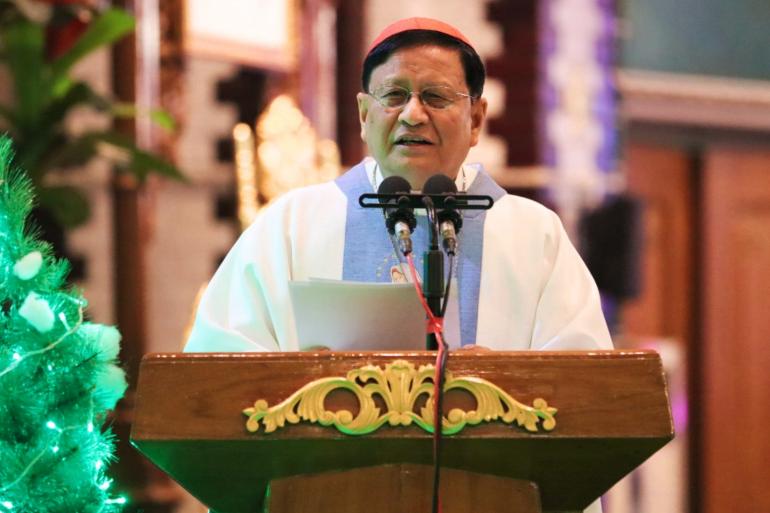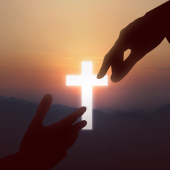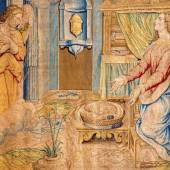God's call to receive and give

Cardinal Charles Maung Bo of Yangon
Dear Brothers and Sisters in Christ,
Peace and Blessings of the Lord Jesus be with you all.
We continue our prayers for a world to heal, a world to reconcile, a world that relates to all.
After the great feast of Incarnation and Epiphany we have entered into the Ordinary Time of the Liturgical Year. In the eyes of God, nothing is ordinary. None of us are ordinary. We are called to see the extraordinary grace of God’s presence in Ordinary times. So, this is also the holy season of celebrating the sacrament of the Ordinary.
This Sunday's readings are energizing. God speaks extraordinary words through today’s readings. Three major revitalizing ideas invigorates us.
1. Each one of us is not ordinary; we are called by name by the Great God
2. Not only called, we are members of his body, the temple of the Holy Spirit
3. God trusts us so much, Jesus entrusts his mission by calling his disciples.
On this Sunday, the Church calls us to celebrate our calling. The readings look like Vocation Sunday readings for inviting men and women to the religious life. Yes we need to pray for vocations. The Church in Asia is the future hope of the global Church. We are no more missionary Church. We are sending missionaries to other places. We are glad that we have Myanmar missionaries all over the world now. Today’s readings call us to follow Jesus in his mission.
But the readings not only point toward the religious life. This call is a call to holiness both in the family as parents and children and also as religious and priests.
The first reading and the Gospel speak of vocation, the calling of God. Christianity raises our simple life to the citadel of glory. God calls us by our name. Yes, this is a magnificent understanding in the Bible. None of us are numbers to God. He knows us – even from the womb. And the glorious verses in the book of Isaiah says:
The one who formed you says, “Do not be afraid, for I have ransomed you. I have called you by name; you are mine. (Is 42:1).
Yes, Brothers and Sisters, God uttered our names. That is our faith. In the Hebrew culture, uttering someone’s name also indicates possession. The verse says: I know you by name: and you are mine. We are God’s possession. This is the consoling thought this Sunday. Let us rejoice with Peter. We are called to the royal house of God. We are God’s own possession.
But you are a chosen people, a royal priesthood, a holy nation,
A people for God’s own possession, to proclaim the virtues of Him
Who called you out of darkness into His marvelous light. 1 Peter 2:9
But some of us doubt this. How can this be? We are small people. How can God remember my name? How can we belong to the Royal House of God? The readings assuage our fears and doubts.
The first reading: the little boy Samuel was called by name by the mighty God. Samuel stands for all the little, forgotten people. Just a boy, with no high illusions about himself, a servant and apprentice to the old man Eli; he slept at night in a little room like an altar boys’ sacristy, at the religious shrine of Israel. Suddenly, in the middle of the night, he heard God calling him by name; eventually Samuel recognizes that the call is from God, and not just from the priest, so he submits himself, heart and soul, to listen to God’s word. Only then did Samuel discover his own potential, his new identity, the role he was to fulfil in life.
God has a special love for the simple people like you and me. When he calls. he empowers. Moses, David and scores of prophets came from simple background. They realize when God comes into their life and calls them, he strengthens them, makes them glorious. In humility, they pray -- a prayer for all the simple people:
Speak Lord, Your Servant hears.
God knows each individual by name totally, intimately, always. None of us is ever ignored by him; like the birds of the air, and all created things, we are forever in God’s mind, under his care (Mat. 10:29). This is our strength, this is our destiny.
Sadly many of us try to build our own name, identity in arrogance. Understanding our self comes from achievements, failures, efforts and ambitions. We are sad that we do not achieve much. God’s plan never enters our mind. Let God enter our lives. He entered our life even from the womb. Let us rejoice at that. We are called by God to be blessed in his plan.
Biblical faith, insists that God calls us into relationship with himself on a day to day basis, always offering us life, and always making demands on us to live our life worthily in his sight. For Christians, specifically, it is a relationship with Christ our Lord that lies at the heart of our identity.
This concept enhances our identity. We are God’s chosen people. Not only are we called by name to friendship with Jesus — we become “members of his body,” sharers in his spirit. In today’s second reading from the first Corinthians, we are upgraded to a great level: we are the temple of the Holy Spirit. God is in us. Emmanuel, God called us from womb. Is there anything more rewarding to be a human being than realizing that we are not only made by God, but of God?
The readings also bring us to the next great inspiration: Life is like the river. Gratefully received and gracefully given. We see two of great servants of God in the readings today: Eli and John the Baptist. Both received their vocation gratefully. But they were not selfish. When they understood the next generation is ready, they gracefully gave the chance. They opened the doors for others.
We can probably all think of people who opened doors for us in life. Perhaps at a crucial moment in our lives they pointed us in the right direction. They were an influence for good on us; maybe they shared with us some gift they possessed, or allowed us to benefit from an experience they had or some discovery they made. We appreciate these people because they had the freedom and the generosity to give something worthwhile away for the benefit of others, rather than keeping it to themselves. Every day we have thousand things to thank for.
That is how John Baptist is portrayed in the Gospel reading this Sunday. He had come to recognize Jesus as a very special revelation of God’s love. Far from keeping that discovery to himself, he shared it with his own disciples, even though he knew that in doing so he was going to lose them to Jesus. He pointed two of his disciples in the direction of Jesus. He opened a door for them, even though it would mean a loss to himself. A short while later, one of those two disciples, Andrew, did for his brother, Simon, what John the Baptist had done for him. He led his brother to Jesus.
In the first reading, Eli did something similar for Samuel, helping him to hear God’s call. The readings this Sunday put before us three people, Eli, John the Baptist and Andrew, each of whom, in different ways, pointed others in the right direction, led others to the one who is the source of life.
The greatest door we can open to others is: Faith in a living God. Think of our parents, the priest who baptized us, those who taught us religion – all of them are like John the Baptist, showing Jesus: Behold the lamb of God. There were others who were like Eli, encouraged us to have a direct relationship God; asking us to say yes to God’s calling – to a family, to a priestly or religious vocation. They opened the door for us. There were others like Andrew, our same age, our friends who were instrumental in opening the doors of faith by guiding us in our dark moments to have faith in God.
Samuel who was led to the Lord by Eli is described in the first reading as a boy. In the gospel reading, the two disciples who were led to the Lord by John the Baptist and Simon who was led there by Andrew were all adults
There were many doors opened to us in life by others : the teachers, the church people, those who gave us employment, those who treated us when we were sick, those who consoled us in our moments of sorrow. All these people were like Eli, John the Baptist and Andrew: they gratefully received and they gracefully gave.
Today’s readings remind us, Be grateful – so many good things happened to you. But that is only half of the story. Freely you received, freely you give. The measure you give is the measure you receive.
There comes a time: all of us need to gracefully give.
Indeed, there can come a time when the Lord asks any one of us to be a John the Baptist or an Andrew or an Eli for somebody else. He may call us to share our faith in some simple way, to open a door to the Lord for others.
Our response to such a call can take many different forms. For Eli it took the form of helping the younger Samuel to find the right words for his prayer. For Andrew, it took the form of sharing a significant experience with his brother.
The readings this Sunday invite us to be open to the many ways the Lord can draw us to himself, and also to the ways that he may be calling us to help him in drawing others to himself.
Gratefully receive Faith and other Gifts: Never forget to gracefully give them to others. As others opened the many doors of opportunity, let us open the doors of opportunity to others.
Thank you,
Stay safe and stay blessed.
Radio Veritas Asia (RVA), a media platform of the Catholic Church, aims to share Christ. RVA started in 1969 as a continental Catholic radio station to serve Asian countries in their respective local language, thus earning the tag “the Voice of Asian Christianity.” Responding to the emerging context, RVA embraced media platforms to connect with the global Asian audience via its 21 language websites and various social media platforms.














